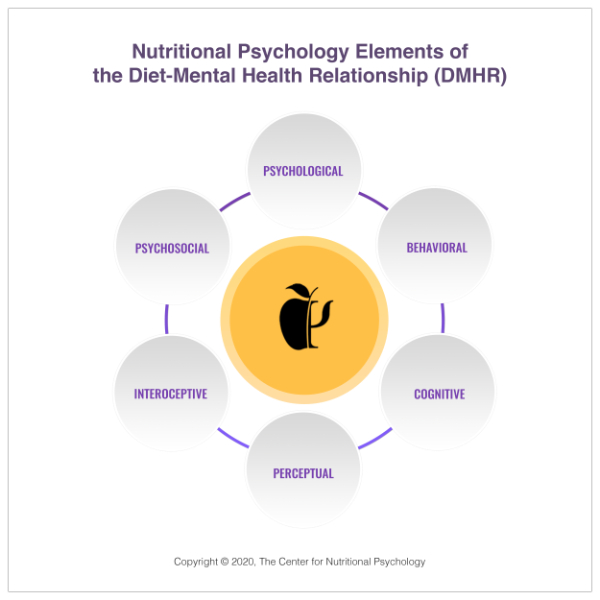The Evolution of Food and Mood: A New Conceptualization in Mental Healthcare

The foods that comprise our dietary and nutrient intake patterns can influence virtually every aspect of our psychological functioning. Most people are aware of the mood-relaxing effects of tryptophan in turkey, and the energizing effects of caffeine, but few are aware of the more complex role that food, nutrients, and dietary-intake play in shaping our mood, behavior, and mental health.
The emerging field of Nutritional Psychiatry has focused on examining the direct relationship between diet and mental health, and the researchers comprising this area have successfully established a corollary, and recently causal link, between diet and certain aspects of mental health.
These findings, together with findings from other related fields have helped us to not only better understand the connection between food and mood, but also the mechanisms by which this connection exists. It turns out that “good mood food” is not merely anecdotal, but can be verified by peer-reviewed studies.
Some of the physiological mechanisms connecting our diet to our mental health include our diet’s ability to influence and impact: 1) the production and regulation of our neurotransmitters, 2) the composition of our Microbiome, 3) the directing of our immune and central nervous systems, and 4) the modulating of our inflammatory and oxidative processes.
Conceptualizing food and mood through a new lens
The psychological mechanisms connecting our diet with our mood and mental health involve examining the relationship between our dietary/nutrient intake patterns and the 1) psychological, 2) behavioral, 3) cognitive, 4) perceptual, 5) interoceptive, and 6) psychosocial elements of our psychological functioning.
Taken together, these physiological and psychological findings form a new conceptualization in the food-mood connection – one that gives a more in-depth understanding of the psychological components comprising the food-mood relationship. This conceptualization lies within a new interdisciplinary field referred to as Nutritional Psychology.
Nutritional Psychology (NP) is the area of study that examines the relationship between our dietary intake patterns and our mood, behavior, and mental health. NP conceptualizes the food-mood relationship in terms of the “Diet-Mental Health Relationship” (DMHR), which in NP terms includes the following elements:

Diet and Psychological elements: The relationship between our dietary-nutrient intake patterns and our psychological moods, emotions and affect (e.g., resilience, flourishing, creativity, negativity).
Diet and Behavioral elements: The behaviors, reactions, and choices we engage in resulting from thoughts and emotions influenced by our dietary-nutrient intake patterns and food environment (e.g., increased reactive behavior or changed dietary behavior patterns).
Diet and Perceptual elements: The relationship between dietary-nutrient intake patterns and the processing and interpretation of sensory stimuli (of which experiences, culture, and socioeconomic factors play a role).
Diet and Interoceptive elements: The internal physiological (somatic) sensations we experience in response to our dietary-nutrient intake patterns (discomfort, pain, energy, fatigue, desire).
Diet and Cognitive elements: The relationship between dietary-nutrient intake and our cognitive functions and capacity, including memory, attention, learning and appetite control.
Diet and Psychosocial elements: Examining the role that family, culture, community, society, and socioeconomic status play in relationship to our dietary-nutrient intake patterns.
When examining the effects of our dietary patterns through the broader lens of Nutritional Psychology, it becomes apparent that not only is there a broad effect of diet on most areas of mental-health related functioning, but there is ample evidence to substantiate the role that food plays in psychological functioning and mental health outcomes.
The field of Nutritional Psychology
Nutritional Psychology is an obvious and natural extension to the traditional practice of psychology. While psychology concerns itself with the psychological, cognitive, psychosocial, and behavioral aspects of mental health, Nutritional Psychology expands this model to include the contributions of dietary intake patterns to all aspects of psychological functioning and mental health.
Mental health professionals already hold the knowledge that contributes to positive mental health, but we believe that the current model is not taking into consideration the role of the Diet-Mental Health Relationship in supporting someone’s mental health. Nutritional Psychology is a natural adjunct to the traditional practice of psychology and stands at the forefront of this knowledge, working to provide another piece of the puzzle for improving mental health.
Findings in the DMHR have evolved beyond simply observing and documenting the role of food in our mood, behavior, and mental health. Through groundbreaking research and clinical studies, we can now take steps to define an area of study that takes control of this knowledge and uses it to improve our lives and potentially impact mental health issues around the globe.
To find out more about the emerging field of Nutritional Psychology, visit The Center for Nutritional Psychology (CNP).
For more information on the role of diet on immunity, visit the CNP Research Library category on Diet and Immunity. For more information on the role of dietary inflammation on mental health visit the CNP Research Library category on Diet and Inflammation.
________________________________________
–Diet-Mental Heath Relationship (DMHR)
–The Center for Nutritional Psychology (CNP)








Leave a comment